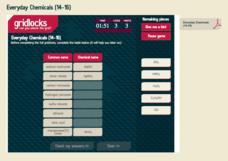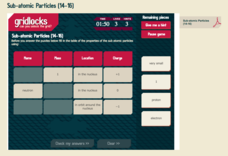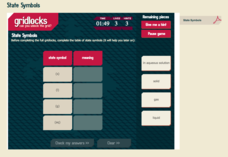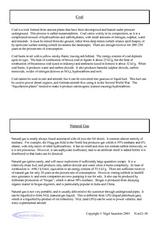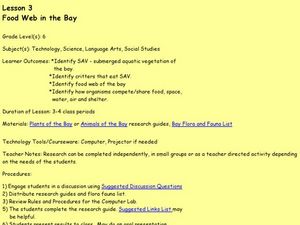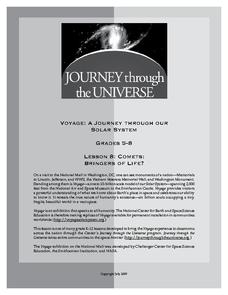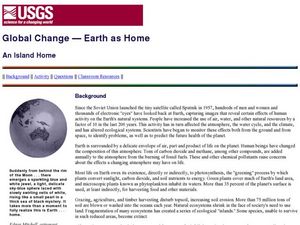Royal Society of Chemistry
Moles Equations (14-16)
In chemistry, the mole is a unit of measurement, much like a millimeter or liter. After learning about moles, scholars learn various equations relating to mass, volume, and concentration. They review each of these equations in a few...
Royal Society of Chemistry
Everyday Chemicals (14-16)
Two men want drinks and the first orders H2O. The second man orders H2O too, but he dies. Scholars apply their knowledge of H2O2 and other everyday chemicals during the activity. They match chemical formulas to common chemical names in a...
Royal Society of Chemistry
Sub-Atomic Particles (14-16)
In 1897, J.J. Thomson discovered the electron, the first subatomic particle proven to exist. Scholars review their understanding of electrons, protons, and neutrons as they work through the puzzles. Each puzzle connects two or three...
Royal Society of Chemistry
State Symbols
When water is a solvent in a chemical equation, we consider it an aqueous solution. Scholars match the name of four states of matter to their proper symbol in a chemical equation. Four puzzles provide repetition to help pupils remember...
Royal Society of Chemistry
Units of Volume
Did you know in the UK a quart is smaller than in America? This explains why a standard unit of measure is necessary for volume. Young scientists learn the similarities and differences between five different units used to measure volume....
Royal Society of Chemistry
Types of Bonding
A covalent bond yells at an ionic bond, "Didn't anyone teach you to share?" Four matching puzzles allow pupils to review covalent, ionic, and metallic bonding. They apply logic and problem solving to complete gridlocks including the...
Royal Society of Chemistry
The Blast Furnace
The largest chemical reactors are blast furnaces, used to make iron from ore. Scholars explore reactants by first matching each one to its purpose and formula. Then, a series of three gridlock puzzles reinforce the content while...
Curated OER
Fuels - The Good, the Bad, and the Ugly
Science pupils choose from twelve questions about five different types of fuel: hydrogen, ethanol, crude oil, natural gas, and coal. They construct a table to compare them and then determine which is the best fuel. Your physical science...
Curated OER
Food Web in the Bay
Sixth graders study the food web in a bay. In this food web lesson, 6th graders investigate the SAV- submerged aquatic vegetation of a bay including their predators, and how the organisms eat, have proper living space and water. They...
Curated OER
Energy and Matter
A review of a full unit on energy and matter, this slide show starts with basic definitions of states of matter and their mass. It then develops the ideas of the forces that that matter can exert. Details about bonding within matter and...
Journey Through the Universe
Comets: Bringers of Life?
Young scientists investigate the elements found in our solar system and then construct a model of a comet. They apply their new knowledge to the formation of the solar system.
Journey Through the Universe
Our Solar System
Take your class on a journey through our solar system. Learners explore each planet, from Mercury to Pluto, and discuss various features that differentiate one from another. They complete activities related to the topics and discuss the...
National Wildlife Federation
Why All the Wiggling on the Way Up? CO2 in the Atmosphere
The climate change debate, in the political arena, is currently a hot topic! Learners explore carbon dioxide levels in our atmosphere and what this means for the future in the 11th installment of 12. Through an analysis of carbon dioxide...
Curated OER
Breathing
When learning about the respiratory system, how do learners know what is important? One way is to use a self-assessment or study like the one found here. While the formatting could use some work, the concepts are solid. Depending on your...
Curated OER
Weather Lesson 1
Students describe and compare the layers of the atmosphere. They explain how to measure the temperature of the atmosphere. They also explain what causes the atmosphere to heat up in some places more than in others.
Curated OER
Seashore Explorers
There are three separate lessons within this resource that can be used together, or that can each stand alone. In the first, five simple activities allow junior scientists to examine the amazing properties of water. In the second, they...
Curated OER
What's the Matter? (Experiments)
Young scholars observe a scientific discrepant event, and are then challenged to create experiments to solve the dilemma.
Curated OER
The Chemistry of Art
In this chemistry of art worksheet, students read about the chemical reactions that turn art made of different metals colors. They answer three questions about the chemical reactions related to metals and art.
Curated OER
Please the Trees, But Not These, Please!
Students study trees. In this forestry lesson, students complete a variety of activities where they learn the basic parts of a tree and their functions.
Curated OER
Global Warming Statistics
Students research real-time and historic temperature data of U.S. and world locations, and analyze the data using mean, median, and mode averages. They graph the data and draw conclusions by analyzing the data. A spreadsheet is used to...
Curated OER
TE Lesson: Fighting Back!
Learners examine the roles of the immune system in keeping the body healthy. They see how engineers contribute to this process by creating antibiotics, and vaccinations. They discuss how an astronauts' immune system may be suppressed...
Curated OER
Carbon Monoxide and Population Density
Tenth graders investigate the carbon monoxide level at a fixed latitude to determine if there is a relationship to population density. They download data sets and generate a graph, and find locations using the Earth's coordinate system....
Curated OER
Worms! Nature's Recyclers
Third graders explore the process of composting. In this composting lesson, 3rd graders read the book Wonderful Worms, and create composters.
Curated OER
Global Change- Earth as Home
Students create their own environment. In this environmental protection lesson, students pretend they are the owners of a tropical island. They create jobs for the citizens and develop the island as a model environment.



